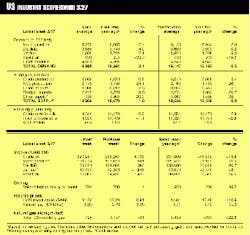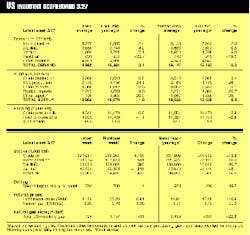OGJ Newsletter
It's a bull market in speculation over the scope of OPEC's expected decision this week to hike oil production.
OPEC should hike output just enough to push oil prices down to $24/bbl, says OPEC Sec. Gen. Rilwanu Lukman.
Lukman says OPEC would base its decision on whether or not to increase production at the Mar. 27 meeting on current global supply and demand levels. Further, he contends that Western oil stocks are not "disturbingly low" when compared with those at the same time last year. "The organization should only raise production enough to achieve the targeted price," Lukman said.
OPEC Conference Pres. Abdullah Bin Hamad Al Attiyah says that the group seeks to stabilize the oil market. "We will wait until Mar. 27, and then we will discuss the situation very carefully," he said. "OPEC will do its utmost to stabilize the market on a condition not to harm consumers and producers."
Purvin & Gertz Pres. Bill Sanderson predicted at P&G's LPG seminar at The Woodlands, Tex., last week that WTI will settle in the mid to low-$20/bbl range by early third quarter: "We expect WTI to trade in the low $20 range in 2001, with continued short-term volatility. Annual average prices [will be] in the $20 range in constant dollars for the next few years."
His outlook was contingent upon OPEC's "measured response" and an expectation of increases in non-OPEC production coming on stream as scheduled. Economic growth in Asia will continue its recovery, he added, and drive petroleum demand there up 4%/year over the next few years.
World oil stocks are at an unusually low level and must start being rebuilt at "a substantial level," IEA Executive Director Robert Priddle said last week. During the second quarter, Priddle said, it will be necessary to balance demand with a stockbuild of 0.5-1 million b/d. This would not be enough to cover forward demand, so there is need to rebuild stocks for the third and fourth quarters of this year, he added.
After a trip the previous week to the Middle East, Priddle said that a "number of producer countries within OPEC recognize that high current prices cannot be maintained for long, for it would encourage development of alternative fuels and R&D in that direction." He also said these countries have an interest in keeping the goodwill of the customers.
The US Congress continues to introduce measures aimed at relieving the effects of high oil prices (see related story, p. 37).
The House of Representatives overwhelmingly passed a bill that requires the White House to review the pricing practices of OPEC members.
The so-called Oil Price Reduction Act also confirms the president's authority to restricting military assistance to countries deemed to be participating in price-fixing. More than one Democratic representative described it as "feel-good" legislation; nevertheless, it passed 382-38 on Mar. 22.
"Sometimes people laugh at Congress," said Martin Frost (D-Tex.), regarding the House bill. "This is a day for laughing."
Meanwhile, in the Senate, Kay Bailey Hutchison (R-Tex.) plans to introduce a bill that would boost marginal well production. The legislation will center on a $3/bbl phased tax credit, to be triggered if oil prices fall to $14-17/bbl. It would apply only to wells producing less than 15 b/d. Hutchison estimates the bill would spur a production increase of 250,000 b/d from 75,000 wells.
"Boosting our domestic oil and gas production is the only permanent solution to today's high gas and home heating oil prices," she said.
On Mar. 17, US Secretary of State Madeline Albright announced the lifting of certain sanctions against Iran. "Today," she said, "I am announcing a step that will enable Americans to purchase and import carpets and food products, such as dried fruits, nuts, and caviar, from Iran.
Other steps include exploring ways to expedite greater contact between US and Iranian scholars, artists, athletes, and nongovernmental organizations; and to step up efforts to resolve all outstanding legal claims between the two nations.
Admittedly, Albright said, good relations would not be restored immediately. "We can't build a mature relationship on carpets and grain alone," she said, "But the direction of our relations is more important than the pace."
In response to the Clinton administration's overture toward Iran, Conoco CEO Archie Dunham said, "There is more to the administration's actionsellipsere- garding relations with Iran than the lifting of prohibitions against the importation of luxury items into the [US]. Sec. Albright'sellipsespeechellipsewas generous, holding out the prospect for increased efforts to solve legal issues between our two nations and for easing processes that govern people-to-people contacts in Iran and the [US]. My hope is that Iran will respond during the next few months with an agreement to conduct government-to-government negotiations."
ONGC overseas arm ONGC Videsh Ltd. plans to join with one of three rival bidders to bolster its position in bagging a contract to develop a newly discovered oil field in Iraq that is expected to yield as much as 300,000 b/d of oil. Negotiations with one of the bidders, yet unnamed, are proceeding in London.
"Along with our joint venture partner Reliance Industries," ONGC said, "we are close to signing a contract for another exploration block in Iraq." A test well there flowed 2,000 b/d of oil. ONGC pegs its investment at about $300 million.
Turkmenistan and Azerbaijan reportedly have reached an agreement allowing shipment of Azeri gas via the Trans-Caspian Gas Pipeline (TCGP)-a planned 2,000-km pipeline from Turkmenistan to Turkey via the Caspian Sea, Azerbaijan, and Georgia. Azerbaijan agreed to trim its demand to about one sixth of the line's 32 billion cu m/year (bcm/year) capacity.
In February, Turkmen President Saparmurat Niyazov rejected a request to transport 14 bcm/year of Azeri gas. Azerbaijan is seeking to transport gas from the world-class Shah Deniz field in the Caspian Sea; it threatened to construct its own pipeline with the BP Amoco-led Shah Deniz consortium but later agreed to a 5 bcm/year share of the TCGP line's capacity.
Ashgabat has agreed to deliver 16 bcm/year of gas to Turkey, with an additional 14 bcm/year to be passed on to Europe to obtain hard-currency earnings. A half-share of the line would have left Turkmenistan with high construction costs and little return.
Should further tensions and disagreements slow the development of TCGP, a separate gas pipeline to Turkey from Azerbaijan is still possible. Deliveries through the line are to begin in 2003, barring any other squabbles.
A formal agreement is yet to be signed, however, and some reports indicate that Azerbaijan is not pleased with its capacity share.
In a move that could lead to the eventual sale of its 160,000 b/d Lemont oil refinery in Chicago, PDVSA is taking a closer look at the profitability of its operations abroad. According to PDVSA Pres. Hector Ciavaldini, those operations that prove to be nonprofitable may be put up for sale. "We are not selling any of our property at this point. There is an investigation that we are carrying out regarding the profitability of our business abroad. The profitability study of our business is going to define whether we are going to sell property," said Ciavaldini, noting that "emphasis is being placed on the Chicago refinery."
He said that, in the case of the Chicago facility, "we cannot place [Venezuelan] crudes there because of its geographical location" and because of the country's current oil production policy.
"If the refinery is not a profitable business, we can sell it, but that must not be confused to mean that we are selling our properties abroad," he added. The Lemont plant currently processes mainly Canadian crudes. PDVSA had purchased a 50% stake in the refinery in the hope of processing Venezuelan heavy crudes; it bought the remaining 50% in 1997 from partner Unocal for $250 million. Local news reports in Caracas have said PDVSA recently turned down an offer of about $200 million from a Texas group in alliance with PEMEX to purchase the Lemont refinery.
Two major oil field service firms have added their names to the ever-lengthening list of mergers and acquisitions (see related stories on pp. 32, 33, and 36). Varco International and Tuboscope plan to merge in an all-stock deal valued at about $840 million. The new firm will retain the Varco name; its shares will be owned equally by the former shareholders of the two partners.
Tuboscope CEO John Lauletta said, "We have assumed only a modest amount of cost savings from consolidation in this transaction, as the real value-creation of this combination will come from enhanced revenue opportunities."

